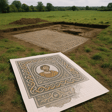Introduction to Pieces of History
00:00:13
Speaker
Hello and welcome to Pieces of History, I'm Colin McGrath. In each episode explore both the renowned and the lesser known events that have shaped our world.
Exploration of Investigative Journalism
00:00:22
Speaker
Today we're delving into the world of investigative journalism, past life memories and the fascinating case studies that challenge our understanding of identity and consciousness.
Tom Schroeder on Reincarnation Research
00:00:31
Speaker
Joining me is Tom Schroeder, award winning journalist and author of Old Souls, a book that follows the pioneering research of Dr Ian Stevenson on reincarnation. Tom's journey took him to Lebanon and India where he witnessed the astonishing stories of children who recalled past lives in extraordinary detail.
Tom's Journalism Career and Reincarnation Interest
00:00:49
Speaker
In this episode we'll explore Tom's career in journalism, what drew him to this controversial subject and the case studies that shaped his perspective on the mysteries of memory and human experience.
Questioning Reincarnation Reality
00:00:59
Speaker
Could reincarnation be real and what does old souls reveal about the nature of who we are?
Tom's Journalism and Writing Background
00:01:04
Speaker
Join me as explore this compelling question. So to kick things off, before we actually get into O'Souz and Dr. Ian Stevenson himself, can you give me a bit your background about um how you got into journalism and how you kind of found this story to to begin with?
00:01:19
Speaker
As an undergraduate, I was interested in fiction, creative writing, and I took several creative writing classes. And and then i realize And then I went on a year abroad to France and to the Netherlands.
Joining the Independent Florida Alligator
00:01:35
Speaker
And I was you know had all my little notebook there. I was going to write my stories. But then I realized that if I didn't have a deadline, I never actually wrote anything.
00:01:47
Speaker
And the only time I had written anything was when I had a deadline for those classes. So I thought, okay, what I need is I need a lot of deadlines. So I decided I would, when I got back to the States, I went to the University of Florida and they had a great student newspaper there called the Independent Florida Alligator.
00:02:07
Speaker
And I said, I'll join the newspaper. And, you know, and I didn't I didn't have a real high regard. You know, I thought of journalists as sort of obnoxious people that, you know, with their hats, with the press and
Magazine Writing and Reincarnation Stories
00:02:21
Speaker
the thing. and But I thought, okay I'll hold my nose and and do it. And, and you know.
00:02:26
Speaker
When I got when I got ah remember I walked into the newsroom was in what in the old the back of ah what was a old greasy spoon kitchen that was defunct. And they still had that the grease covered exhaust hoods over the news desk. It was hilarious.
00:02:45
Speaker
And I went in and I said to the editor, I said, well, I don't have any. He says, what experience do you have? I says, well, I don't have any. And he says, well, that doesn't matter.
00:02:55
Speaker
Just show up. So that's what I did. I showed up and I very, and this was during the Watergate here with the Woodward and Bernstein. and And so that was inspiring.
00:03:06
Speaker
And it was also during the inception of what what was called the new journalism with Tom Wolf, where people were trying to use fictive techniques to write ah to write nonfiction.
00:03:21
Speaker
And of course, that really appealed to me. And it appealed to a lot of the, and what I realized was, I had a lot more in common with the people in the newspaper office than I had with the people in the writing seminars, you know, who wrote these like really purple things. And I remember my last class, somebody read this thing that was so, so, you know, overwritten and everything. And and when they asked for comments, I said, well,
00:03:51
Speaker
You know, what what it what it lacks in clarity, it makes up for an obscurity. so So, no, I was not very popular in those classes. But anyway, I found my tribe.
00:04:01
Speaker
in in the And all along, my my inclination was to write journalism as narrative. Because to me, you know, you didn't really understand a story You didn't really understand something and then you could until you could sort of understand it as a story.
00:04:21
Speaker
So that was that was how I got into it. And I sort of naturally gravitated towards magazine writing.
Investigating Past-Life Memories
00:04:28
Speaker
And I had an opportunity to become an editor at the Sunday Magazine at the Miami Herald, which was a great Sunday Magazine.
00:04:39
Speaker
And they did a lot of sort of innovative, experimental type stuff. And then I became the editor of it. And, um you know, I came across a, there was a a psychiatrist in Mount Sinai Hospital in Miami Beach, who was very well regarded in his profession.
00:04:59
Speaker
And he became a bestselling author of books about regressing his patients to previous lives. And he presented it as evidence that reincarnation is real.
00:05:14
Speaker
So I thought, well, it appealed to me that you know this establishment guy sort of becoming this new age guru. So I did a story on him and the cases didn't impress me as evidence. I mean, there were interesting stories, but there were people who were just like, you know, asked to imagine things and they imagined them.
00:05:33
Speaker
You know, that's what it and there was nothing about there there was nothing in their accounts of previous lives. that they couldn't have sort of made up or gotten from novels, historical novels or reading magazines or whatever.
00:05:48
Speaker
But when I was doing the research, I came across the work of Dr. Ian Stevenson, who was a psychiatrist at the University of Virginia. And his cases really impressed me because they were very small children who often as soon as they could talk began to just spontaneously say, oh i you know, I had another mother and father, you know, I have my real house, you know, and describe it, etc.
00:06:13
Speaker
And that and he discovered that. And he'd been doing this for 30 years, traveling the world, finding cases where this had happened and investigating them to see how reliable they were.
00:06:24
Speaker
In some cases, these kids gave names and names of villages and and family members, and they could identify an actual dead person that they were talking about. And then they matched what the kids had said to the facts of the lives. And very often there was a very um close accuracy of,
00:06:45
Speaker
of the kids were saying. And it was very hard to explain since they were little, you know, they weren't getting this from reading, from reading, you know, or watching TV or movies because they were like four years old or something or five when they started to say this. Plus their affect was they were very, you know, emotional about it, you know, and it, and when I, so when I traveled with him, well, I'm getting ahead of the story, but anyway, that's how I got into it, into writing about,
00:07:14
Speaker
about reincarnation. So roughly in your in your book, you were saying this story took place in the late It kind of ruminated for about 10 years. And it was roughly around 1997. You got in touch with Dr. Ian Stevenson and you were able to make your first trip over to Beirut.
00:07:30
Speaker
How did that come across with him? He was 80 at that point. This is going to be one of his last trips. Yes. Well, the the first thing he said to me when I contacted him You know, I called. I didn't even know if he was still alive.
00:07:43
Speaker
So I called him up. And the first thing he said to me when he found out I was a journalist I wanted talk to him, he says, well, I'm interviewed out. And then, he you know, and his his attitude was he wanted to be taken seriously by fellow scientists.
00:07:57
Speaker
And he felt that journalism would just be sensationalize it. You know, and I tried to tell him, no, I want I want to take a really serious look at it. And, you know, I sent him some stuff that I had written. And, you know, it took me well I think it took me like almost two years to persuade him.
00:08:14
Speaker
And plus, then he said, well, and plus, I'm i'm retired now. You know, my wife says, I'm not going on any more trips. But I persisted and I went up and visited him in Charlottesville. And he says, well, I might make a couple more trips.
00:08:28
Speaker
And eventually he said, you can you can come with me. And of course, on the basis of that, I got a book contract.
On-Site Investigations and Cultural Reactions
00:08:34
Speaker
And then I thought, oh, great. well I mean, what happens if I go with him and this is transparently false, you know, that either he turns out to be a nutcase or the kids seem to be and their families seem to be obviously putting the kids up to this or making stuff up.
00:08:52
Speaker
Then I don't, you know, i so I knew that was a possibility. when When we went there, but as soon as we got dot on the ground, it was clear that there was no simple explanation for these cases. These kids were just reporting what they experienced and their families didn't care if we believed them or not. It wasn't like it wasn't like they were invested in this and wanted something out of it And in some cases, the families actively did not want to talk about it and were trying to suppress it.
00:09:22
Speaker
So that was even more impressive in a way, because, you know, a lot of cynics and critics of his work will say, well, you you know, these families are in it for the publicity or whatever.
00:09:33
Speaker
But that's clearly not the case. You know, a lot of in some cases was the opposite. They didn't want they didn't want anybody to know about it And also, Tom, as an aside for this as well, I thought is very interesting where he was able to get his funding from this. Was from the gentleman who invented Xerox?
00:09:52
Speaker
Yes, Chester Carlson, who had an interpersonal interest in this. And actually, you know, Stevenson had been the head of the Department of Psychiatry at the University of Virginia.
00:10:03
Speaker
But then when he started getting into this, it was like they did not appreciate that. They thought it was going to, you know, make them look like a bunch of kooks or something. So that basically pushed him out and they probably would have been happy if he just left entirely. But that's when he got the large grant from Chester Carlson.
00:10:27
Speaker
So, you know, the university is always glad to have donors. So he had this little institute set up on the side and, you know, on so on the outskirts of campus in this old but what I think that once was a single family home, you know, and you go in and the the office is this just crowded with these filing cabinets and all the filing cabinets were filled with thousands of case reports that he had written up.
00:10:54
Speaker
And that's the other thing about this is it turns out that this phenomenon isn't all that rare. Kids all in all different cultures all over the world come up with this stuff and puzzle their parents and their, you know, and in many cases,
00:11:09
Speaker
cultures where reincarnation isn't accepted, you know, the parents will say, that's not stop talking nonsense, you know. And that accounts why maybe there are more cases in countries that do have a belief in reincarnation because, you know, they don't shut the kids up.
Compelling Reincarnation Cases
00:11:27
Speaker
It's maybe one of those things, Tom, in the West, it's just not spoken about. and if it is, like you said, it's kind of brushed under the carpet. like, they're just a child. Let's just not listen to them. We'll move on.
00:11:38
Speaker
And one of the key things, before we kind of get into the details of it, whenever people were regressed as adults, like you said, they were always like in the the Napoleonic Wars or they were you in the Tudor period and They can make all these things up. They can be verified.
00:11:51
Speaker
While a lot of the children, whenever you got to Beirut and India, and then towards the latter stages of the book, you've got a case that's in the U.S. as well, they were able to pinpoint exactly what their names were, ah their mom and dad were, if they had a job, how they died. And it was very specific information.
00:12:08
Speaker
It was in a recent time period. Yes. And the other thing is, is that these cases were... often very unglamorous lies. I mean, the other idea is that people want to fantasize these glamorous lies for themselves, you know, because it's and but these, you know, like they'll remember a a ah the life of an underemployed auto mechanic.
00:12:32
Speaker
No, nothing really exciting about that. and yet they've, you know, very emotionally involved with it. And, you know, and they they there was, there was very touching in some cases, like there was this little, I think he was seven at the time we, we talked to him.
00:12:51
Speaker
And from the time again, from the time he could talk, and this was in, in the hills outside of Beirut. This was just a few years after this devastating civil war that they had there.
00:13:04
Speaker
They were Druze and in particular, and they had been, bombarded, you know, are basically the the U.S. had been hoodwinked by the people in charge in Beirut into believing that there were Syrians in these hills.
00:13:20
Speaker
So they pulled up a destroyer out offshore and started pounding the hills. And this boy remembered the life of ah teenager. who and had been helping out with his militia buddies on this bunker and had been killed by that bombardment.
00:13:39
Speaker
and And so the the family, and he knew the name, you know, he knew the name of the family and everything. And it was a pretty tight-knit community, so it was easy to find the family and and and the kid told them what he remembered. and And they accepted that he was the reincarnation of their dead son to the point where he began to serve, you know, in ceremonial functions in the family, he would he would serve the role of eldest son, even though he was younger than his than the surviving brothers of the kid who was killed.
00:14:15
Speaker
And, you know, and and his parents said, and this is a good example of the emotional connections, his parents said that when he was little, he would cry all the time, you know, saying he missed his family, e cetera, et cetera.
00:14:29
Speaker
But then as soon as they made the connection, he was fine. And when I talked to him, I said, well, are you still? Who are you? Are you still? And he says, well, I used to be Fadi, you know, but now this is a new life. You know, now I'm me.
00:14:45
Speaker
So, you know, it's and you get a lot of that kind of thing. And, you know, it just felt authentic to me. as As a journalist, Tom, whenever you're sitting in some of these houses with these people and they 100 percent believe that, you know, this was happening.
00:14:59
Speaker
but What was your point viewpoint? Sorry. sitting in these houses thinking these people think this is true i'm from the west this is a completely different area psychological space that i live in or i'm from did you have a disconnect at this point you know i i was trying to look at it as evidence you know and ah and just evaluate it and say okay well what are other explanations i mean did did these families have any previous contact you know did did Did the family know this other family and talk about it and the kid maybe picked up on?
00:15:35
Speaker
So I start, you know, I just went through possible other alternative explanations. And as far as, you know, we could chase it down, wouldn't. For instance, in the in the the instance of the kid who remembered being a auto mechanic, he actually...
00:15:54
Speaker
remember getting being in a car crash with his friends that his friends were driving fast. They were, they got in a dispute with another driver and they were like driving fast and they went off to the road and flipped.
00:16:09
Speaker
and And he actually remembered you know them looking at the at him on the ground and saying, oh, it's too late for this guy. That was one of his memories. So we actually spent a day going to um the old in the newspaper morgue and searching on, because we had an idea of the date of when this accident was.
00:16:33
Speaker
And we searched on on microfilm looking for an account of the accident. And then we we actually found one. And it really was very close to what he had said. The only difference was he said they were in a convertible.
00:16:49
Speaker
And the story said that they were in a sedan, but that the roof had been torn off. Interestingly, that when and in the crash, the roof had been torn off. So but everything else with that that it was like this, you know, that they had gotten into dispute, that there was this chase and that one of the cars flipped.
00:17:06
Speaker
So that was really interesting that we could find that. And then there was another case in India where and this was an interesting case because this was a case where the parents suppressed the story.
00:17:21
Speaker
Their little girl kept saying that you aren't my real parents, you know, my real parents live in such and such a village, and this is their name. And they would like actually beat her for saying that.
00:17:33
Speaker
they They considered it disrespectful. And then um this they had a milkman, which is not like what you're thinking of where they bring the milk to the door. This is a guy who came and walked milked their water buffalo for them.
00:17:49
Speaker
um And he was out there and she comes running out and says, please, will you take me to see my father? These people, on these people, and her parents won't won't let me go.
00:18:01
Speaker
and she started, he started asking her, what where what are you talking about? And she named the village and the name of the family. And of course he didn't, you know, he didn't.
Evidence and Cultural Beliefs on Reincarnation
00:18:10
Speaker
do anything, but he went and he knew somebody, a woman who had married a friend of his who had come from that village.
00:18:18
Speaker
And he said, he mentioned this to the the friend and she says, there's somebody that name, you know, that that family lives in that village and they lost a daughter, you know, just before this little girl was born.
00:18:33
Speaker
They heard about, the family heard about it. And they sent a bunch of of men from the village and some of the elders and the father of the girl unannounced to visit this this family.
00:18:46
Speaker
And what they they all told us was that she had been out playing with her sisters. And when she came back, she comes in the gate and all these strange men are sitting there.
00:18:57
Speaker
And the first thing, and one of the elders says, hello, pretty, can you show us who your father is? And she ran and jumped up on on the guy's lap and said, please take me home with you.
00:19:11
Speaker
You know, and and there were met multiple witnesses who said that that was true. Now, of course, so I'm thinking, well, okay, maybe they were visual clues, you know, maybe everybody was looking at the father and everything.
00:19:23
Speaker
So then we go and go visit the family of the, of the dead girl. And they say, oh, no, no, because she came here. You know, they brought her here. And immediately she named everybody. She recognized everybody and called them by their name.
00:19:40
Speaker
And she even said, and where's my sister? And because there was one of one of the girls had married and gone to live in village. So she even was aware, according to them, you know, there were like, again, there was like a dozen witnesses. She asked about somebody who wasn't there by name, you know, very spooky stuff. And so we went and spent, we went to this rural police station in that area.
00:20:06
Speaker
And because this, they said that she had been hit by a car. And that but I mean, that was her memory. What her memory was when she said, how did you die?
00:20:17
Speaker
She said, I fell from I fell from up high. And so that didn't match because they said, oh, well, you know, she was hit crossing the road in car. So we went to the police station and and this is in rural India. And and i just to give you a little bit of the atmosphere, we drive up to the police and across the road, there's a car accident with a dead body still sitting in the front seat.
00:20:43
Speaker
And i mean, for there were four at the time I went there, i read that car fatalities per per capita entity were 40 times greater than they were in the United States.
00:20:53
Speaker
So, and we saw a couple of fatal accidents while we were there. But anyway, there's, buy and then we go into the police station and there's this cop arguing with his boss about who's going to go and deal with the body.
00:21:04
Speaker
And the guy like the cop is saying, well, you know, let their family come. and I don't want to deal with it. So with that as the background, we start digging through these closets where these old moldy log books, huge leather bound log books.
00:21:21
Speaker
All they're like tumbling off the shelves. They're not even in order. So we're like digging through these and we actually find the one right day. And then we find the incident report.
00:21:33
Speaker
And remember, she says she fell from high. and the And the report said that the car knocked her like 10 feet in the air and then and killed her. So I don't know. that Fell from a height, 10 feet in the air.
00:21:47
Speaker
You know, there's that's the sort of thing you're dealing with is that, you know, if if it doesn't line up perfectly, you know, it's there's these... the sum total of of all of this is that i didn't believe that they were making this up on purpose i didn't believe that they were subconsciously creating these stories to match their prior beliefs because in some cases there were people who didn't believe in reincarnation you know and in other cases They were from cultures that believe in the reincarnation, but the details of how the culture believed the reincarction occurred didn't match what the kids were saying. they
00:22:25
Speaker
Like the Druze believed that the reincarnation happens instantly upon the death of the previous personality. Well, these kids remembered you know, people who had died years or months, or you know, before they were born.
00:22:40
Speaker
They were making these cases up to support their beliefs. Wouldn't they, wouldn't they sort of conform with the beliefs? And the other thing is, is that in case in India, where they believed in karma, there was no apparent sort of reward or punishment for the previous life. It just seemed random.
00:22:59
Speaker
So, okay, i didn't believe I didn't believe that they were making it up or that they were crazy. They clearly weren't crazy or that they had you know ah ulterior motives or that it was, you know or they were having creative memory for changing things.
00:23:15
Speaker
none of that really fit these cases. It was certainly not all of them. And it only took one, you know, to be real. But on the other hand, you know, nobody, and and here was where I hit the wall, because nobody could provide any suggestion for how this works.
00:23:33
Speaker
You know, what is it exactly that is transferring from a dead person to a new child? what well Was it their personality, is it their talents, is it their memories?
00:23:44
Speaker
you know And the the ones that made you think it was real, it was the memories that ah counted, right? you know there's no expert There's no conceivable explanation in science for how that could occur.
00:23:58
Speaker
Then Dr. Stevenson, one of the key um scientific, I suppose, protocols that he used was the use of birthmarks. So say, for example, if somebody, like you said, have was shot or in an in an accident, the recipient of the new soul, let's just call it, had a birthmark from the previous person.
00:24:18
Speaker
did Did you find those cases as well while you were? Yes, yeah. and And some of them were impressive. There was a... a kid who remembered the life of a guy who had been shot by a crazy person.
00:24:31
Speaker
He had been sitting on his patio eating breakfast, and the guy came up and shot him, and the bullet went through his jaw from one side the other, severing his tongue. And this kid had birthmark on either side, roughly, not exactly, but roughly corresponding to the autopsy report of where the exit and entrance wounds were.
00:24:55
Speaker
So that was pretty impressive. But on the other hand, he didn't, he grew up not far from where this murder happened. The murder got attention at the time. And so you you can imagine a kid with birthmarks on either side.
00:25:08
Speaker
Here's the story about somebody getting shot and having, you know, having a wound in those places and making that identification, identifying this as an explanation for his birth.
00:25:20
Speaker
So, I mean, that's a possibility. And also not all the birthmarks matched exactly and not all cases of violent death had any birthmarks at all.
00:25:32
Speaker
So, so it's, it's none of the, none of the evidence was like perfect. You know, it was, there's always these little things. And yet the phenomenon of children just randomly and spontaneously saying these things is so, you know, it's so universal that something is going on there.
00:25:54
Speaker
So, i you know, I spent a lot of time thinking about how science works and And how but Stevenson at one point said to me, science only changes one funeral at a time, meaning that even in science, which is supposed to be purely evidence based, that there comes an orthodoxy and that, you know, yeah the the people who sort of hold to that orthodoxy have to die out before you can a new direction can be accepted.
00:26:23
Speaker
you know But you think about, okay, here's an example of a phenomenon that made no sense at the time and seemed completely almost impossible, was that they did measurements of, but they they they actually measured the speed of of light you know from a star or from a sun to or from a sun to the earth.
00:26:46
Speaker
And then they measured the speed both with the earth moving away from the light and with the earth moving towards it at a high rate of speed. So, I mean, if you're if you're riding on a bicycle and you're heading towards a car, you would think the car would approach you at the cars speed the car's going plus the speed the bis bicycle's going, right?
00:27:07
Speaker
That makes sense. And it's, in fact, what do you find when you measure it. And if you're riding away from it, then you'd subtract. Well, it turns out the speed was exactly the same.
00:27:19
Speaker
whether the earth was moving towards the light or moving away. And that's, and people are saying, well, that can't be right. that's yeah That's ridiculous. you know And they couldn't they they couldn't get past their their absolute, they didn't even know that they were just totally accepting the idea that the space was fixed, you know, and that um and that motion was against some absolute background.
00:27:45
Speaker
And that's where Einstein came along. He says, no, that's not the way it works. And this proves it. The way it works is space motion is in time even in space, they're all relative to the observer.
00:28:00
Speaker
So there's one fixed thing in the universe, and that's the speed of light, and that everything else works in order to make that true. So okay, so that's where you have an observation that doesn't make any sense. But then they figure out a ah an explanation for it, which was hard for people to accept. It was that, you know, that actually everything in the universe is relative to everything else.
00:28:28
Speaker
But then they beat were able to use that to make predictions about how things would behave. And the predictions fit perfectly towards this new dynamic.
00:28:40
Speaker
But then you take, okay, so you take these kids and you think that these kids are saying these things about previous lives. And it doesn't give rise to any underlying explanation or the ability to make predictions about, you know, what, you know, um than what I said to Steven says, well, there is one prediction you could make.
00:29:00
Speaker
It said, if you did a survey of any 10,000 people, you would find some of these cases, you know, which I think is true. But again, there's no, and and people say, well, physics, you know, they say, well, physics is weird now, you know, with quantum energy and all that.
00:29:16
Speaker
So that must be, this is weird and physics is weird. So, but there really is no connection between that, at least none that anybody can say. So you're, you're up against this, this brick wall, you know, where there's this phenomenon that seems real, but then there's no explanation for it. And, and they understand how energy works pretty well. And, uh,
00:29:40
Speaker
None of it would include the creation of a ah soul that passes from one body
Reflections on Reincarnation and Dr. Stevenson
00:29:47
Speaker
to the next. There's no energy field that would accommodate that.
00:29:51
Speaker
So what do you do with that? Well, you know, that's what I've been struggling with for 25 years. And I, you know, I haven't really reached much of a resolution. I mean, I think often about the idea that if you have a dog and you try to teach that dog calculus, that dog is never going to be able to grasp calculus, period.
00:30:11
Speaker
So why should we think we're any different? I mean, we're we're still mammals. We still have similar brain and nervous system to a dog.
00:30:22
Speaker
So isn't it possible that it's just totally beyond our reach? So, you know, and also I've, you know, I've had other anomalous personal experiences that,
00:30:34
Speaker
you know, I want to believe or just, you know, I should believe or just purely random coincidence, but they don't seem that way to me. So, ah you know, so I guess, you know, I'm at a very unproductive place, which is that don't think these cases are manufactured. I don't think they're, I think they represent something real, but that we have no idea what that is.
00:30:59
Speaker
And we never know what that is. That's where I've kind of ended up. and In relation to Dr. Ian Steenson, he died a number of years ago now. And during the course of his, like you said, 40-odd-year career, he looked at about 2,500 cases, roughly.
00:31:16
Speaker
What do you think his legacy is at the end of the day? Well, I think, I mean, a lot of people, and people have been interested in this. I've been talking about this for the entire 25 years. Recently, there was recently there's there was A popular Apple podcast about one of about one reincarnation case in the UK. I don't know if you ran across that.
Conclusion and Call to Subscribe
00:31:39
Speaker
I get podcast requests all the time. Somebody wants to wants me to do a podcast about it, you know, in the near future. and I've sold the film rights to this a dozen times.
00:31:54
Speaker
And then there's one active of now. So, I mean, i think his legacy is what I really noticed when I first did this was that everybody talked about this ring this hypnosis, the recalling past lives through hypnosis.
00:32:12
Speaker
And almost nobody talked about Stevenson's work. And that's how I finally convinced him to let me come was he kept saying, well, you know, I don't i don't want, you know, I don't want it to be feel like I'm sensationalizing it.
00:32:27
Speaker
And I said, well, after 30 years, nobody has taken it seriously. So what is it you have to lose exactly? You know, so now I think that a lot more people are taking it seriously and especially i mean for some reason, even more so recently.
00:32:44
Speaker
So I think that's, you know, I think that people recognize that there is something authentic going on here. And it's extremely mysterious, to say the least.
00:32:58
Speaker
That was Tom Schroeder, journalist and author of Old Souls. A huge thank you to Tom for sharing his experiences investigating reincarnation, the work of Dr Ian Stevenson and the remarkable cases that continue to challenge our understanding of life and death.
00:33:11
Speaker
If you'd like to read Old Souls, you can find it on Amazon, Waterstones and independent bookstores. Make sure to subscribe and rate Pieces of History Podcast on iTunes Spotify and you can contact me at piecesofhistorypod.outlook.com or on Instagram and Facebook at Pieces of History.
00:33:27
Speaker
Thanks for listening.




















